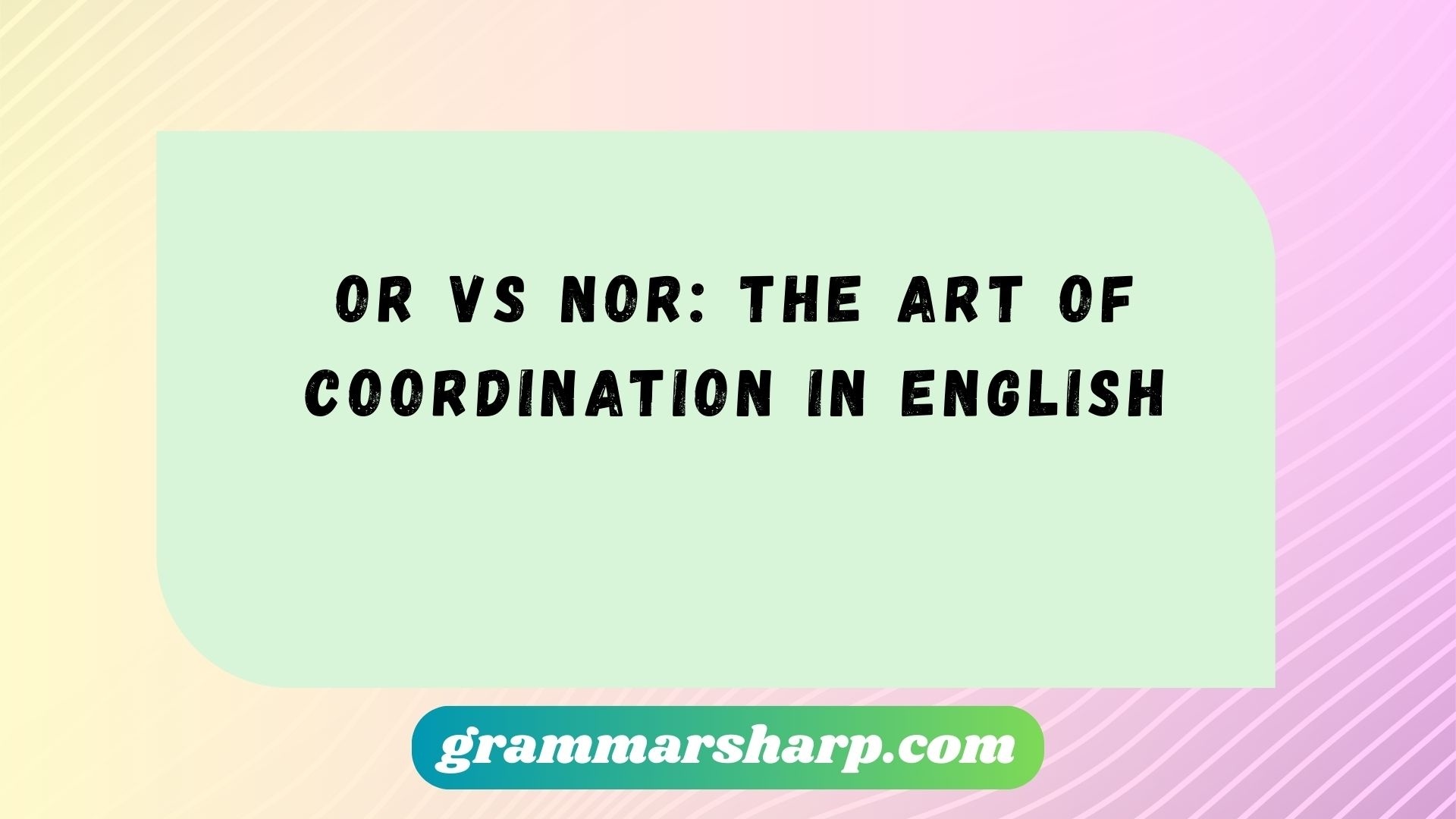Words like or and nor might look tiny, yet they carry enormous weight in English. They’re more than just fillers between ideas; they shape meaning, tone, and even the logic behind a sentence. Many learners confuse the two or avoid “nor” altogether because it feels old-fashioned. But here’s the truth: mastering these words is like unlocking a new level of clarity in writing and speech.
Think about it. When you say, “Would you like tea or coffee?” you’re offering a choice. If you say, “I don’t like tea, nor do I drink coffee,” you’re ruling both options out. One small change completely flips the meaning.
The beauty of coordination in English lies in how words link ideas together. Conjunctions are the invisible threads weaving sentences into logical, flowing expressions. Without them, language would feel choppy and disconnected. That’s why understanding how to use or and nor is not just a grammar exercise—it’s a practical tool for clear communication.
In this article, we’ll explore everything you need to know about these two words. You’ll see examples from everyday English, literature, law, and even computer programming. You’ll also get side-by-side tables, easy memory tricks, and practical rules you can apply immediately. By the time you’re done, you’ll feel confident choosing the right word for any context.
What Is Coordination in English?
At its core, coordination means joining two or more ideas of equal importance in a sentence. English does this with coordinating conjunctions, such as:
- and – adds ideas.
- but – contrasts ideas.
- or – presents alternatives.
- nor – presents negative alternatives.
- so – shows result.
- yet – shows contrast with surprise.
- for – gives reason.
These words belong to the classic grammar acronym FANBOYS.
Here’s a quick table to clarify:
| Conjunction | Function | Example Sentence |
| and | Adds ideas | She sings and dances. |
| but | Contrasts | I like pizza, but not pasta. |
| or | Offers a choice | Tea or coffee? |
| nor | Negative alternative | He doesn’t smoke, nor does he drink. |
| so | Shows result | It rained, so we stayed inside. |
| yet | Unexpected contrast | It’s cold, yet sunny. |
| for | Reason | I stayed home, for I was tired. |
Notice that or and nor both link alternatives. The difference lies in tone—or is neutral or positive, while nor is strictly negative.
Understanding the Word “Or”

The word or is one of the most common conjunctions in English. It gives choices, offers alternatives, or presents possibilities.
Everyday Uses of “Or”
- Choices in Questions: “Do you want pizza or pasta?”
- Alternatives in Statements: “We could walk or take the bus.”
- Conditional Options: “Call me tonight, or I’ll assume you’re busy.”
Inclusive vs Exclusive Or
In logic and math, or can mean two different things:
- Inclusive or: Either one or both options are true.
- Example: “You can have tea or coffee.” (You might get both.)
- Exclusive or: Only one option is true, not both.
- Example: “Press yes or no.” (Not both at once.)
In daily English, the meaning often depends on context.
Common Mistakes with “Or”
- Adding unnecessary commas before or in short sentences.
- Forgetting subject-verb agreement when choices are compound.
- Confusing logical “or” with casual conversational “or.”
Understanding the Word “Nor”
Unlike “or,” the word nor is less common in everyday speech, but it plays an important role in expressing negatives.
Defining “Nor”
- Nor introduces another negative idea.
- It almost always follows neither in formal English.
- Example: “Neither the manager nor the staff were available.”
Sentence Structures with Nor
- Neither…nor: Joins two negatives.
- “Neither John nor Mary came to the meeting.”
- Standalone Nor (inversion):
- “He didn’t call, nor did he send a message.”
Modern vs Traditional Usage
In casual English, many speakers replace “nor” with “or.” For example:
- Casual: “I don’t like coffee or tea.”
- Formal: “I don’t like coffee, nor tea.”
Both are acceptable, but formal writing favors nor.
Example Sentences with Nor
- “She didn’t answer the phone, nor did she reply to the email.”
- “Neither the rain nor the wind stopped the parade.”
Or vs Nor – The Key Differences
Let’s put them side by side for clarity:
| Feature | Or | Nor |
| Meaning | Offers choice | Extends negative meaning |
| Tone | Neutral or positive | Negative |
| Common Use | Daily speech | Formal writing |
| Examples | “Tea or coffee?” | “Neither tea nor coffee.” |
Quick rule: Use or when you’re giving options. Use nor when you’re extending negatives.
Sentence Structures with “Or”

Simple Sentences
- “Do you want apples or oranges?”
Compound Sentences
- “You can watch a movie, or you can read a book.”
Lists with Or
- “You may choose red, blue, green, or yellow.”
Punctuation Rules
- A comma before “or” is optional in short lists.
- In longer lists, use the Oxford comma:
- “You can choose apples, bananas, pears, or grapes.”
Sentence Structures with “Nor”
Neither…Nor
- “Neither the teacher nor the students knew the answer.”
Inversion with Nor
When nor starts a clause, the verb comes before the subject:
- “Nor do I agree with that decision.”
Formal vs Casual
- Formal: “I don’t smoke, nor do I drink.”
- Casual: “I don’t smoke or drink.”
Common Errors
- Using “nor” with a positive clause.
- Forgetting verb inversion after “nor.”
Or vs Nor in Questions
- Or appears in questions offering choices:
- “Do you prefer cats or dogs?”
- Nor rarely appears in modern questions.
- Traditional: “Nor did he try to help, did he?”
- Modern: Rare outside literature or formal speech.
Or vs Nor in Logic, Law, and Programming
Logic
- In Boolean logic:
- OR = at least one condition is true.
- NOR = not OR (neither condition is true)
Law
Legal contracts often use nor for precision:
- “The company shall not accept liability, nor shall it compensate losses.”
Programming
- In coding, OR and NOR are logical operators.
- Example in digital circuits: NOR gate outputs “true” only if both inputs are false.
| Field | Or | Nor |
| Grammar | Offers choice | Extends negatives |
| Logic | At least one true | Neither true |
| Programming |
Or vs Nor in Literature and Rhetoric
Authors and poets often use nor for rhythm and emphasis.
Famous Examples
- Shakespeare: “Nor heaven peep through the blanket of the dark.” (Macbeth)
- Lincoln: “Government of the people, by the people, nor for the people, shall not perish…” (Gettysburg Address, variation in drafts)
The word “nor” adds gravity, formality, and a poetic edge that “or” lacks.
Quick Tips to Remember the Difference
- Or = Options. Think of a menu.
- Nor = Negative. Think of crossing things off a list.
- Mnemonic: “N” in “Nor” stands for Negative.
Do’s and Don’ts
- Use or in choices.
- Use nor in negatives.
- Don’t use “nor” without a negative first.
- Don’t forget verb inversion with “nor.”
Mini Quiz
don’t like apples, ___ do I enjoy pears.
- Answer: nor
Do you want coffee ___ tea?
- Answer: or
Conclusion
The difference between or and nor goes beyond grammar—it’s about meaning, tone, and precision. Use or when giving choices or alternatives, and reach for nor when extending negatives. Both words help you coordinate ideas smoothly, but they aren’t interchangeable.
While “or” dominates in daily conversation, “nor” holds its ground in formal English, legal writing, and even poetry. By practicing their correct usage, you’ll sharpen your communication skills and avoid common mistakes. Next time you face a choice between words, you’ll know exactly which one to use.
FAQs
Can “nor” be used without “neither”?
Yes, especially in inversion structures like “He didn’t call, nor did he write.”
What’s the difference between “or” and “nor” in negative sentences
Use or in casual negatives (“I don’t like pizza or pasta”) and nor in formal contexts (“I like neither pizza nor pasta”).
Is “nor” old-fashioned
Not at all. It’s less common in speech but still essential in writing, law, and literature.
Why don’t we hear “nor” in casual speech
Because everyday English tends to simplify, people often drop “nor” in favor of “or.”
What’s the easiest way to remember?
Think: “Or = Options. Nor = Negative.” Simple and effective.

